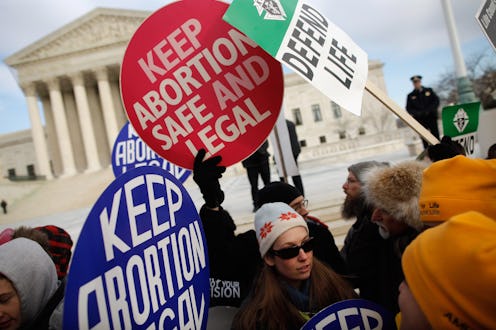News
Mississippi Could Ban Abortion After 15 Weeks & It’s Part Of A Larger, More Alarming Plan

Women seeking an abortion in the state of Mississippi may soon face a new wave of restrictions. HB 1510, which passed the state's Senate on Tuesday, would ban abortions at 15 weeks, and Mississippi Governor Phil Bryant is expected to sign off on it if clears the state's House and reaches his desk. If passed, Mississippi would have the most restrictive abortion law in the United States.
UPDATE: On Friday, March 9, lawmakers in the Mississippi House passed HB 1510. The 15-week abortion ban now heads to Gov. Bryant's desk.
“There is no question that HB 1510 is a strategic move by the anti-choice movement to make Mississippi the first state where legal abortion is no longer accessible," said NARAL Pro-Choice America national communications director Kaylie Hanson Long in a statement provided to Bustle. She also underscored the impact that restricting abortion access can have on women:
We know what happens when abortion is illegal or inaccessible: women are forced to travel out of state to get essential care, women who can’t afford to take time off of work or travel outside the state are left with nowhere to turn, and we know that when abortion is banned, the number of abortions doesn't go down, the number of deaths and injuries to women go up.
Reproductive rights activists have grown increasingly concerned that the initiative is part of a step-by-step move to eventually ban abortion in the state wholesale, and eventually, across the country. Some believe that this legislation — as well as any other potential future bans — are part of a ploy to bait inevitable lawsuits that could ultimately reach the Supreme Court. There, it's feasible that, faced with the right challenge, the court could end up overturning Roe v. Wade, the landmark court case effectively legalized abortion on a federal level.
This is compounded by the fact that the Supreme Court currently has a 5-4 conservative bent. Conservatives, of course, are more likely to vote in favor of limiting abortion access.
Indeed, staunchly anti-choice activist groups have begun to explicitly express plans to bring an abortion challenge before the Court. "[W]e are focusing right now on two specific types of abortion bans," Denise Burke, senior counsel for the anti-choice group Alliance Defending Freedom, said at January's Evangelicals for Life conference. "So we’re not looking at regulation, we’re actually looking to enact abortion bans."
She also described 15-week bans as bait for lawsuits, and specifically mentioned the Mississippi proposal in her talk. "Once we get these first-trimester limitations in place, we’re going to go for a complete ban on abortion except to save the life of the mother," Burke said.
"Mississippians are committed to protecting the lives of unborn children, and this law will be a major step in accomplishing that goal," Mississippi Lt. Gov. Tate Reeves told The Clarion-Ledger, a daily paper based in the state's capital, in discussion about the bill. "I am committed to making Mississippi the safest place in America for an unborn child."
The owner of Mississippi's only abortion clinic says that they plan to sue if the bill is signed into law. Speaking to the Clarion-Ledger, Diane Derzis said that anti-abortion groups were proposing "anything and everything" in an effort to reach a new Supreme Court decision on the legality of abortion.
She told the paper that the groups were backing "anything that could start winding its way through the legal system because we're in a very fragile place right now. Roe is clearly in danger and that's what they're preparing for." She continued, "They hope by the time they get to the Supreme Court they will have changed the Supreme Court."
As it stands, Mississippi's 15-week abortion ban is sitting in the state's legislature because of proposed changes by the Senate. If the state's elected officials agree on the edits, it will advance to the governor's office.